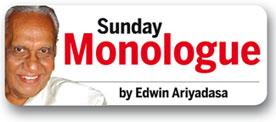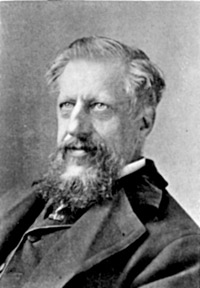Sir Edwin Arnold : Spiritual hero
 "Carata bhikkhave carikam "Carata bhikkhave carikam
bahu jana hitaya
bahu jana sukhaya."
O monks, travel along
For the well-being of many.
for the good of many.
Supremely Enlightened Buddha
This is the ideal season to celebrate heroes especially of the
spiritual kind. Vesak 2010, is in the offing. In 2011, Vesak dawns
ushering in the 2600th anniversary of the attainment of Supreme
Enlightenment by Ascetic Siddhartha. In the spiritual annals of mankind,
this is an unprecedented moment.
This is the hour, people year, for a beacon of compassion, to
illuminate their path, out of the current morass of conflict and
disharmony. In some theatres of human existence, terrorism still mars
the beauty of life.
A spiritual hero, we invariably remember in such a troubling context,
is Sir Edwin Arnold. He presented to the world, his glorious epic poem
"Light of Asia" a unique work in the field of spiritual literature. Its
special loftiness is essential to be noted.
That is the only original poem written in English on Prince
Siddhartha, who later attained the stature of the Supremely Enlightened
Buddha.
His "Light of Asia", first brought out 131 years ago, in 1879,
startled the English-speaking world, by the austere majesty of its
central character-Prince Siddhartha.
 |
|
Arnold: author of
‘Light of Asia’ |
The intellectual and spiritual evolution of Edwin Arnold, is equally
absorbing as his epic poem.
He was born in Sussex, England on the 10th of June 1832. His
education was distinctly imperial. Young Edwin Arnold went through
King's School Rochester, King's College London and University College
Oxford.
At the age of 24, he came over to India, as Principal, Deccan
College, Poona. His mission was clear-cut. He had to uphold imperial
prowess and enshrine British values in the souls of the Indians.
But, the change he experienced, when he encountered the age-old
cultural and religious traditions of India, is a stirring story of
spiritual transformation.
His discovery and profound appreciation of the perennial philosophy
of ancient India, made him a life-long champion of the soul-enriching
system of Buddha's teachings.
The host culture overwhelmed him with its nobility and variegated
manifestations. With him, it was not merely the casual surprise, that
the initial meeting with a strange way of life, engenders in a newcomer
to an unfamiliar system of thoughts and values. Eventually, this initial
surprise evolved into unabashed enchantment, escalating progressively
into lasting admiration and awe.
At this stage, it is imperative, that we should extol the virtues of
some distinguished British Civil Servants, who came out to the East
(especially to India and Sri Lanka) to impose imperial rule on these
subject nations. With an impressive sense of duty and responsibility
they made it their moral obligation to study the lands and the peoples
they met, discarding the role of cynical administrator. Sri Lanka's own
Leonard Woolfe, is a vivid case in point. Engrossed in Sri Lanka's
indigenous culture, he culled its essence into his classic "Village in
the Jungle."
Out of the whole breed of enlightened British Civil Servants, the
Imperial Administrator who delved deepest into the inner soul of the
people he had to transform - without even the shadow of a doubt - was
Edwin Arnold.
He had to traverse a demanding path. To enter into the heart and
soul, of the land, he had to imperialize, he set out to study the
classical languages of the sub-continent - Pali and Sanskrit. These were
the key to the timeless love that India kept guarded over the long sweep
of history. Indian servants took this Imperial student under their wing,
totally convinced that his commitment was genuine.
Doors that remain usually closed to the routine bureaucrat, began to
open wide to Edwin Arnold. With befitting awe and reverence, he
approached the grand epics of India - Ramayana and Maha Bharata.
Hoary India, revealed its spiritual mystique to this ardent British
Sishya (pupil) Edwin Arnold. From then on, his movement towards the
discovery of the twin religious institutions of India-Renunciation and
asceticism - was a matter of course. This in turn, led him to the
renunciate par excellence and the Greatest Ascetic of India-Siddhartha
Gautama.
Assuming a self-imposed duty, he resolved, that what he realized
through his exploratory effort - the core, the pith and the substance of
the Indian philosophic system - should be communicated to his own
people, in their language.
The outcome of this determination was "Light of Asia" - the
tremendous epic poem on Prince Siddhartha.
The poem, recreates the life of a Hindu Royal family in ancient
India, 2500 years ago. The telling detail is dramatically utilized. The
rhythm and the resonance of the poetry, elevate the reader or the
listener to divine heights. The grandeur and the reverberations of the
lines keep on ringing within you. It is the kind of poetry, that makes
you attain the higher reaches of spirituality.
The diction and lilt of "light of Asia" resonate with the echoes of
the 'organ - roll' of John Miltons" spiritual poetry. It is quite
evident that Edwin Arnold was profoundly influenced by the poetic tones
of John Milton's spiritual epics.
Millions of readers, the world over, would have savoured the sacred
ecstasy of absorbing the lyrical word of Edwin Arnold as he extols the
life and the spiritual quest of Siddhartha Gautama. He composed his epic
poem, after he returned to England. There, he was editor "Daily
Telegraph' for more than 40 years.
As Edwin Arnold says, he composed his epic poem 'Light of Asia" in
the intervals of days without leisure'
The epic was an immediate success. It had a hypnotic hold on the
world of English speakers.
Reading Edwin Arnorld's "Light of Asia", is a rich experience in high
poetry.
In his epic poem "Light of Asia", he creates a perpetual halo of
spiritual heroism, around the life of Prince Siddhartha.
It is a poem, generation after generation will re-discover. His deep
interest in the tradition of Indian learning, prompted Sir Edwin Arnold
to translate several Indian Classics into English. He translated the
sacred test of Hinduism - "Bhagavat Gita" into English, under the title,
"Song Celestial".
Sir Edwin Arnold, was an active participant in ushering in the
renaissance of Buddhism.
It is recorded that, he was a founder member of the Mahabodhi Society
of India, together with Anagarika Dharmapala.
Towards the end of his days Sir Edwin Arnold travelled to Japan. He
was married three times. His third wife was Tama Kurokawa, a Japanese
lady.
He wrote several works on the life of Japan, setting down his
personal impressions of that land.
There is a view that Sir Edwin Arnold visited Sri Lanka, to study
Buddhism. It is also said, that he studied the Sinhala Language.
Today in Sri Lanaka, we experience a heightened sense of
spirituality. The land is getting ready to celebrate one holy season of
Vesak.
While being preoccupied with Vesak this year, our country looks
beyond it to our Vesak season of 2011. In 2011, Sri Lanka, and many
other countries in the world, both Buddhist and non-Buddhist will
celebrate the 2600th anniversary of the attainment of Supreme
Enlightenment by Ascetic Siddhartha.
Celebrating Sir Edwin Arnold and his Supreme Epic Poem "Light of
Asia", should form part of these Vesak festivities
We could organise recitals of Sir Edwin Arnold's "Light of Asia" for
schools and for the public .
Sir Edwin Arnold's life story should be written down to celebrate the
person, who made the world, take note of the Prince of Peace. Production
of and authoritative biography of the author of "Light of Asia" is an
excellent way to remember the epic.
|

